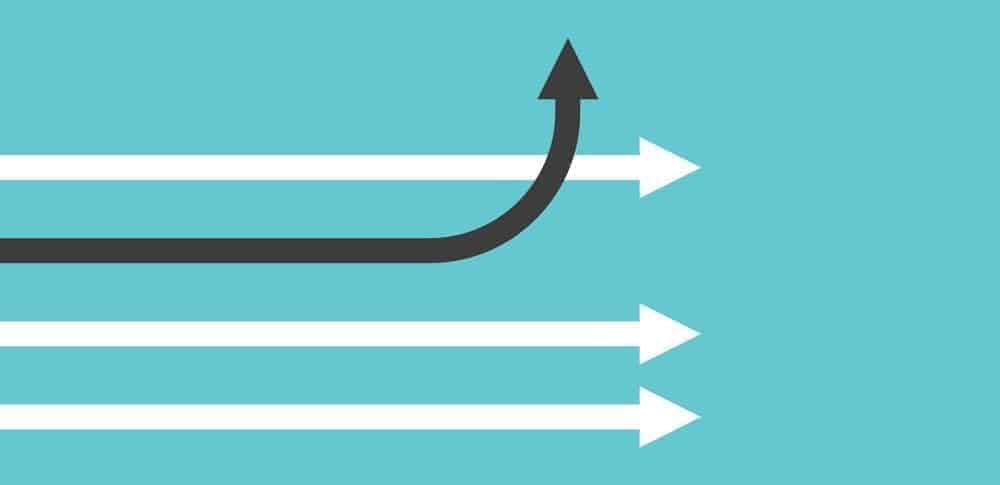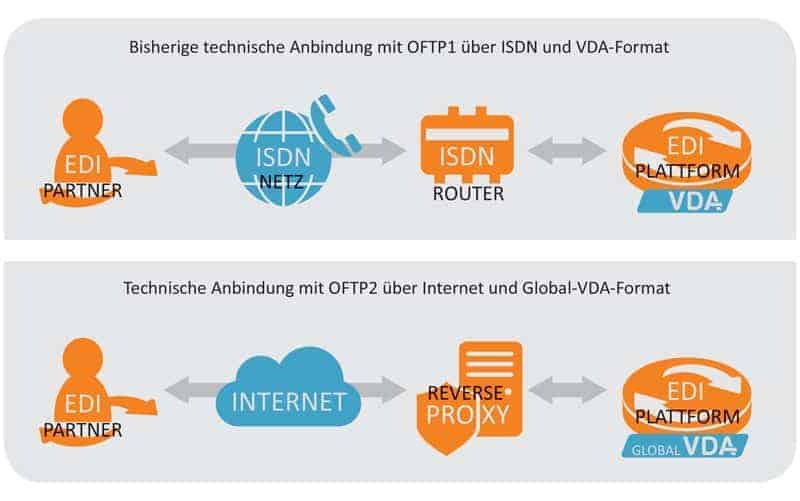EDI in transition


The processes have been working smoothly for decades: In the automotive industry, many companies exchange their EDI data fully automatically via ISDN with their major customers - right across the country, seven days a week, 365 days a year.
Deutsche Telekom is now planning to switch all its telephone and data traffic to Internet Protocol (IP) by the end of 2018 and finally discontinue its ISDN offering. In doing so, Deutsche Telekom is also driven by the market, because fewer and fewer manufacturers are still offering ISDN equipment or classic switching technology.
Even now, spare parts are often no longer available. In the long term, it is simply uneconomical to maintain an analog and a digital network. In addition, the energy consumption of the old ISDN technology is many times higher than that of IP-based transmission.
An IP-based network infrastructure
The new magic word is all-IP. The entire communications network is being digitized end-to-end. An IP-based, uniform packet-switching network infrastructure is being created under the name NGN (Next Generation Network).
The conversion of the ISDN infrastructure to Internet communication via IP has far-reaching implications for companies. Logistics workflows, process interfaces, ERP systems, middleware - almost everything is affected.
As of now, software, applications, hardware and communications equipment must be put to the test. Especially in the B2B and EDI environment, this means a critical challenge for IT departments.
Particular attention should be paid to the existing hardware, such as telephone systems and terminal equipment, and their ability to communicate with and on the World Wide Web. The first step is to check whether the existing EDI system supports Internet-based protocols at all.
There are far-reaching effects especially for OEMs and suppliers in the automotive industry. Here, completely new requirements are placed on the EDI systems used.
The switch to the Internet-based network protocol OFTP2 (Odette File Transfer Protocol) is also associated with the use of various encryption and signature methods. If this is not yet established in the companies, an important new field of activity also arises through the structured procurement, issuing and management of certificates.
Another problem is the still faltering broadband expansion (DSL, VDSL) in the area. After all, OFTP2 requires a stable Internet connection. Metropolitan areas such as Hamburg, Frankfurt, Stuttgart and Munich have long since been supplied with the high-speed network of the future, but things look worse in other, more rural regions. Thus, the fact that high-speed Internet is still not being provided nationwide may become another challenge for the industry.
Efficient solutions for on-premise EDI
cbs B2B Toolset:
For customers who already use SAP Process Integration/SAP Process Orchestration as an integration platform or are pursuing an SAP platform strategy, the cbs B2B Toolset is a good choice. It includes a best practice framework, mapping templates and automated data extraction and testing tools. The toolset has been developed as part of numerous EDI implementation and migration projects. It provides a cost-effective and secure foundation for a 100 percent SAP-based integration and EDI platform.
Lobster_data integration platform:
Through its partnership with software developer Lobster GmbH, cbs offers Lobster_data, an alternative platform for hybrid data and application integration. Lobster_data has comprehensive out of the box functionalities for the classic EDIFACT-based connection of partners. E-invoicing solutions, ZUGFeRD as well as connections from ERP systems to Salesforce can be implemented efficiently and easily. This makes it possible to quickly implement new interfaces and efficiently realize complex integration scenarios.
[/av_promobox]
Introduction of global VDA standards
Due to changed business processes, there is another construction site in the EDI area due to the replacement of the existing old VDA (German Association of the Automotive Industry) data formats. Various OEMs, such as VW, MAN, Volvo and Daimler are in the middle of implementing the Global VDA Standards and are introducing them across the board according to a tight schedule.
These include the message types VDA4938 (Global Invoice), VDA4987 (Despatch Advice) and VDA4984 (Delivery Instruction). In the course of the format changeover, the portfolio of EDI messages used will also be streamlined, harmonized and standardized. Legacy formats outside Europe, such as the ODETTE format, will also be gradually replaced.
Suppliers must then take a holistic view of their relevant business processes and review them. This also includes the mapping of the affected processes in the ERP system up to the implementation of the formats and technical transmission of the messages.
In addition to the coordination of processes, on the technical side the implementation of the new formats requires close consultation with the respective OEM. This involves introduction dates for the new standards, the design of test scenarios and the go-live.
In addition, arrangements may also have to be made with external EDI service providers. Advantage: The upcoming format change also opens up certain savings potentials for the supplier companies in terms of maintenance, monitoring and operation of the EDI solutions.
There is a further innovation in electronic invoicing in accordance with the "Directive of the European Parliament and of the Council of April 16, 2014". This involves the Europe-wide introduction of a standardized digital invoice, also known in this country as the Central User Guide of the Electronic Invoice Forum Germany (ZUGFeRD).
Electronic invoicing is catching on
Electronic invoicing will become much more important, particularly in communications with authorities and in semi-automated transmission processes. In addition, specific e-invoicing requirements exist in many countries (for example, in Spain, Mexico, Brazil, Peru and Chile), which must be taken into account when communicating with local partners and authorities.
In South America, the tax authority is generally the recipient of the e-invoice. This is therefore a business-to-government (B2G) process. The right organizational and technical course must be set at an early stage.
Conclusion: Bring EDI specialists on board
Is your company ready for the upcoming technology change? Are your EDI systems state of the art? It is advisable to familiarize yourself with the changes at an early stage. The upcoming technical innovations must be evaluated holistically and within the framework of the B2B strategy.
To this end, it makes sense to bring suppliers and customers, various internal departments such as Finance, Sales and IT, and external EDI specialists with a broad consulting portfolio on board at an early stage. cbs supports customers with strategy workshops and best practices.
The experience from numerous global B2B and EDI migration projects and SAP implementations flows into this. In addition, our consultants take future cloud and IoT requirements into account.
For the technical scenarios such as OFTP2, Global VDA and e-Invoicing, there are a wide variety of solutions. These range from a new EDI-enabled integration platform such as SAP Process Orchestration or Lobster to a scalable cloud solution.
Any solutions must be examined on a case-by-case basis and evaluated against the background of the individual initial situation. In addition to the selective expansion of the already existing solution, it can be advantageous to include alternative platforms, forms of operation and processes in the decision.









